Government Contract Accounting
Saving Government Contractors Time and Money While Maintaining Compliance
Many government contractors believe they must use a specific accounting software package to be deemed DCAA compliant. All of ROSE’s client systems have been approved by the DCAA when audited—100 percent of the time, regardless of the accounting database used. Our leading-edge platform, Easby, supports most accounting software systems. With our FaaS solution, your DCAA compliance will be enhanced, and you’ll also gain the functionality found in an Enterprise Resource Planning (ERP) system.
Getting started with ROSE®
Experience the difference that our GovCon expert and leading-technology can make.
Schedule a Call
A quick introductory call can give you the information you need to determine what's possible with FaaS.
Assess Your Needs
Assess your options and determine whether you require a comprehensive solution or simply need to fill in the gaps where your existing team and systems need support.
Implement Your Solution
Implement your solution with a seasoned team of experts who not only execute your solution but also provide ongoing support month in and month out.
Our Government Contract Accounting Software Partners

For Start-Up to Mid-Sized GovCon's
Full or partial ROSE FaaS Solution Plus:
- Conversion to or optimization of Quickbooks
- Integration of Easby to support meaningful financial reporting that is timely and accurate
- Cost-effective and scalable Quickbooks solutions
- Minimize GovCon/DCAA compliance-related risks

For Small to Mid-size GovCons
Full or partial ROSE FaaS Solution Plus:
- Conversion to or optimization of Procas
- Integration of Easby to support meaningful financial reporting that is timely and accurate
- Cost-effective and scalable Procas solutions
- Minimize GovCon/DCAA compliance-related risks

For Small to Mid-size GovCons
Full or partial ROSE FaaS Solution Plus:
- Conversion to or optimization of Unanet
- Integration of Easby to support meaningful financial reporting that is timely and accurate
- Cost-effective and scalable Unanet solutions
- Minimize GovCon/DCAA compliance-related risks

For GovCons Preparing for Scale
Full or partial ROSE FaaS Solution Plus:
- Conversion to or optimization of Deltek Costpoint
- Integration of Easby to support meaningful financial reporting that is timely and accurate
- Cost-effective and scalable Costpoint solutions
- Minimize GovCon/DCAA compliance-related risks

Schedule Your GovCon Call
Our cost-effective and scalable solutions deliver the meaningful, timely and accurate financial information and guidance you need to make better business decisions, minimize compliance-related risks and improve financial performance.
GovCon Solutions for Your Business
GovCon Support
- Contract Administration Assistance
- Questions on DCAA Compliance
- Contract Review
Annual Budget
- Preparation of Annual Operating Budget
Provisional Rates
- Indirect Rate Pool Development and Analysis
- Provisional Rate Submissions
Proposal Support
- Cost Proposal Preparation & Review
- CAS and FARS Support Related to Your Specific RFP
- Negotiations with Contracting Officers
Incurred Cost Submission
- Assistance in Year-End Review of Contracts and Records
- Prepare Incurred Cost Electronic (ICE) Schedules
- Interface Directly with DCAA Regarding Submission
Contract Reconciliations
- Preparation of Adjustment Vouchers
- Analysis of Rate Variances
- Assistance with Contract Close Out
Accounting Manual
- Policies and Procedures Manual Development
- Annual Policies and Procedures Manual Update
DCAA Audits and Reviews
- DCAA Audit Interface/Assistance
- Pre-award
- ICE Audits
Letter of Adequacy
- Review Accounting Policies and Procedures in Accordance with the DCAA Audit Program

Our FaaS solution, Easby, combines people, process, technology, organization, and data. to simplify and automate accounting functions, ensure compliance, and deliver strategic guidance and financial analysis from a team of top finance and accounting professionals.
Learn more about how Easby can fit your needs.
Our Finance as a Service (FaaS) Solutions
Whether you are seeking full-service government finance and accounting solutions or want to choose the solution that best fits your company’s needs, turn to ROSE for the financial clarity you need to make confident business decisions and achieve more—all at the fraction of the cost of managing these processes internally.
Outsourced CFO and Financial Management Solutions
Our fractional CFO and financial management services provide you with financial clarity to make confident business decisions.

Accounting & Functional Services
We’re leading the paradigm shift from traditional outsourced finance & accounting services to Finance as a Service (FaaS).

Tax & Compliance Services
We tailor our tax and compliance solutions to each client’s needs based on their current needs as well as their future plans. Regulation compliance include federal taxes, state and local jurisdictions, Federal Acquisition Regulations, DCAA, and more.

The ROSE® Difference
Industry Pioneers.
Many finance and accounting outsourcing firms are years behind in providing the systems and best practices we’ve been developing and delivering to clients for over a decade. Today we’re leading the charge in Finance as a Service (FaaS).
Trusted Advisors.
Our part-time CFOs and finance managers provide superior financial guidance to our clients—and serve as their trusted advisors, providing key performance indicators and recommendations for financial performance improvements.
Cost Effective & Scalable.
Through our advanced technologies and cloud-based platform, we’ll ensure you have a cost-effective and scalable financial infrastructure, saving you approximately 20 to 50 percent of what it would cost to manage these processes internally.
In Our Client's Words
Read what our satisfied clients have to say about their experiences with us. Your success story could be next!
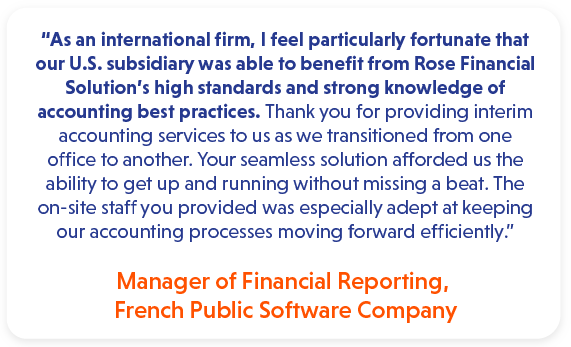
Slide title
Write your caption hereButton
Slide title
Write your caption hereButton
Slide title
Write your caption hereButton
Slide title
Write your caption hereButton
Slide title
Write your caption hereButton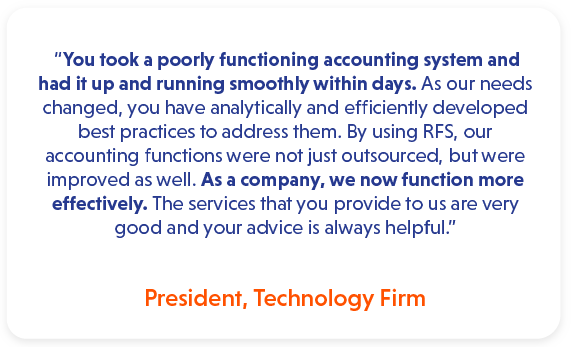
Slide title
Write your caption hereButton
Slide title
Write your caption hereButton
Slide title
Write your caption hereButton

Slide title
Write your caption hereButton
Slide title
Write your caption hereButton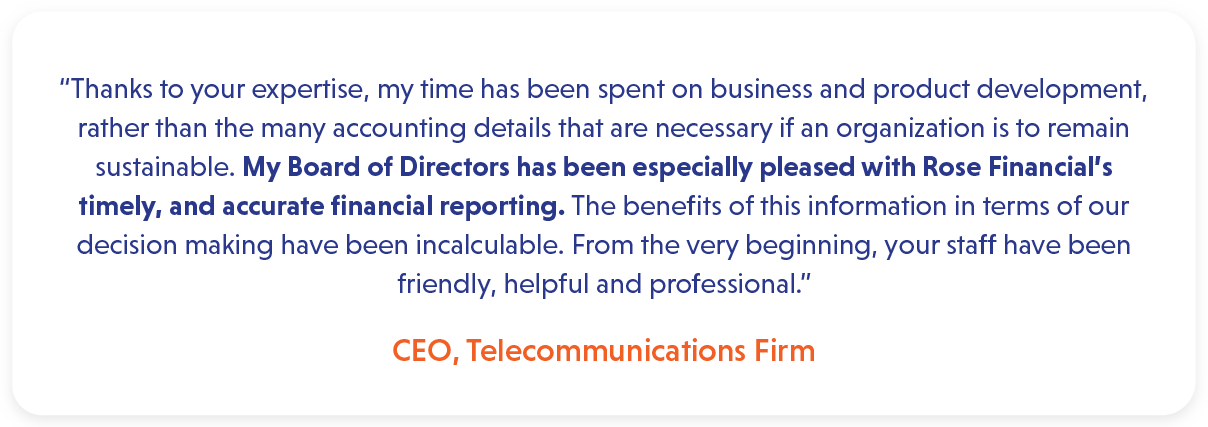
Slide title
Write your caption hereButton
Slide title
Write your caption hereButton
Slide title
Write your caption hereButton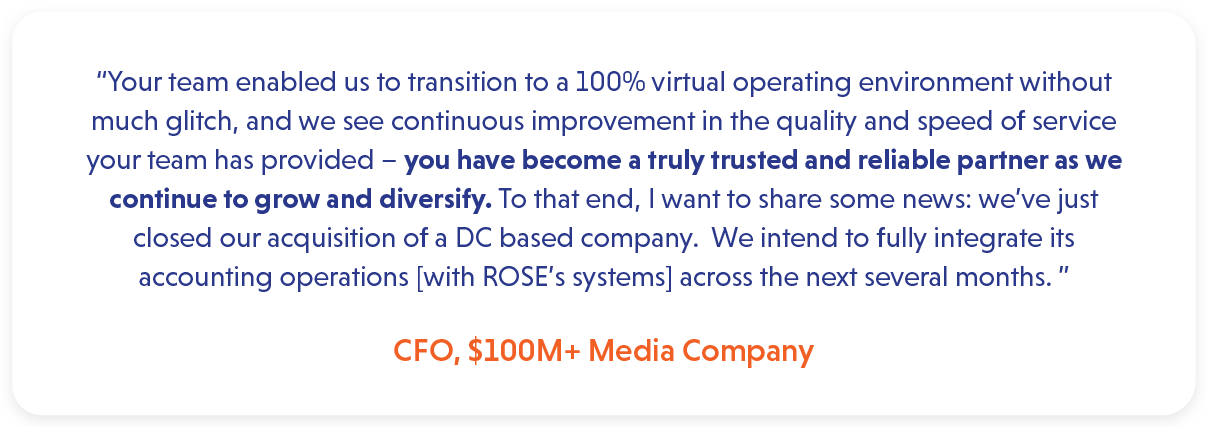
Slide title
Write your caption hereButton
Slide title
Write your caption hereButton
Slide title
Write your caption hereButton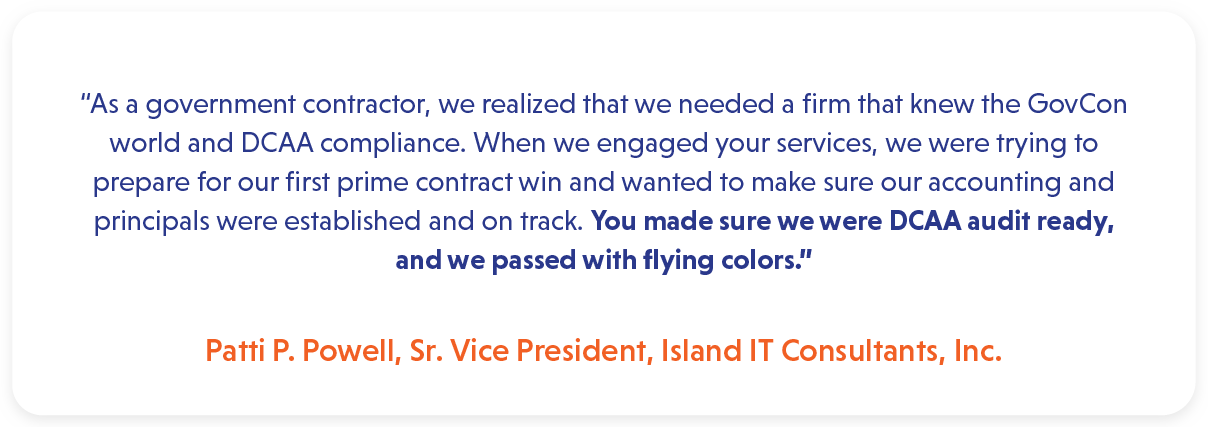
Slide title
Write your caption hereButton
Slide title
Write your caption hereButton
ROSE Insights
Start your path to financial success and security now – take the first step by diving into our extensive collection of articles, tips, and expert advice. Don't miss out on the opportunity to bring clarity to your financial future!
How can we help you achieve financial clarity?
Ready to gain financial clarity and take control of your financial future? Reach out to us now by filling out this contact form. Our team is here to answer your questions and guide you toward a brighter financial horizon.
Let's start the conversation today!






